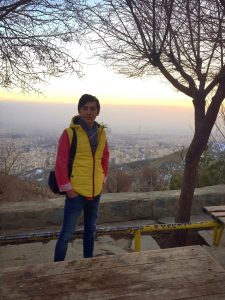 Story by Adlan Margoev, Dual degree NPTS (MIIS/MGIMO), ’18
Story by Adlan Margoev, Dual degree NPTS (MIIS/MGIMO), ’18
Since I remember myself, I’ve barely spent a day speaking just one language. My parents come from the Pankisi Gorge, Georgia, where around ten thousand people, called the Kists, have been living for a couple of centuries. Another ten thousand, my family included, live in Russia and some other parts of the world.
They are bilingual; they never created characters for their language nor did they borrow characters from other languages – it is easier to learn and use the official language of the countries they live in for most purposes other than everyday conversation. So, the language remains a spoken one and is sometimes called a dialect of the Chechen language, which is the closest to the Kist language in terms of grammar and vocabulary. However, the Kist language could be called an independent language because it has several dialects as well. As some linguists say, the difference between dialect and language is an army and borders

Since most Kists practice Islam (and a small number – Christianity), Arabic names are quite popular among them. My name means in Arabic ‘Fair’ or ‘Just.’ For this reason and to speak the lingua franca of the Middle East, I wanted to learn Arabic. However, those who study international relations at Moscow State Institute of International Relations (MGIMO) and receive full scholarship do not choose their language and region of studies. A day before my classes started I found out that I had been assigned to the Persian (Farsi) group, to learn the language spoken in Iran, Afghanistan, and Tajikistan.
My most fascinating language experience was a trip to Iran. Allameh Tabatabaee University organized a language school for a group of Russian students, and we spent two weeks in Tehran. Since I looked and sounded native, I could buy cheaper museum tickets and pay as an Iranian student. However, there was a funny story as well. One time I entered an Armenian church and started talking to a person in charge, he immediately told me to leave the place because he could hardly believe I was a foreigner – Iranian Muslims are prohibited by law from going to religious sites which belong to other denominations.

The more I studied Iran, the more interested I became in its nuclear program, and later – in nonproliferation of weapons of mass destruction and global security. Right after my graduation I joined a new dual degree program launched by MIIS, MGIMO and the PIR Center, a prominent Russian think tank that initiated the program. I was happy to continue learning Persian as a non-regular language here in Monterey, and I do enjoy my classes.
I believe learning a foreign language helps to develop empathy and flexibility. It requires a lot of effort to listen and to understand, as well as makes one look at things from various perspectives and reshape the framework of perception of the world. Whether I join a think tank or Foreign Service in the future, these skills will always be of utmost importance.

